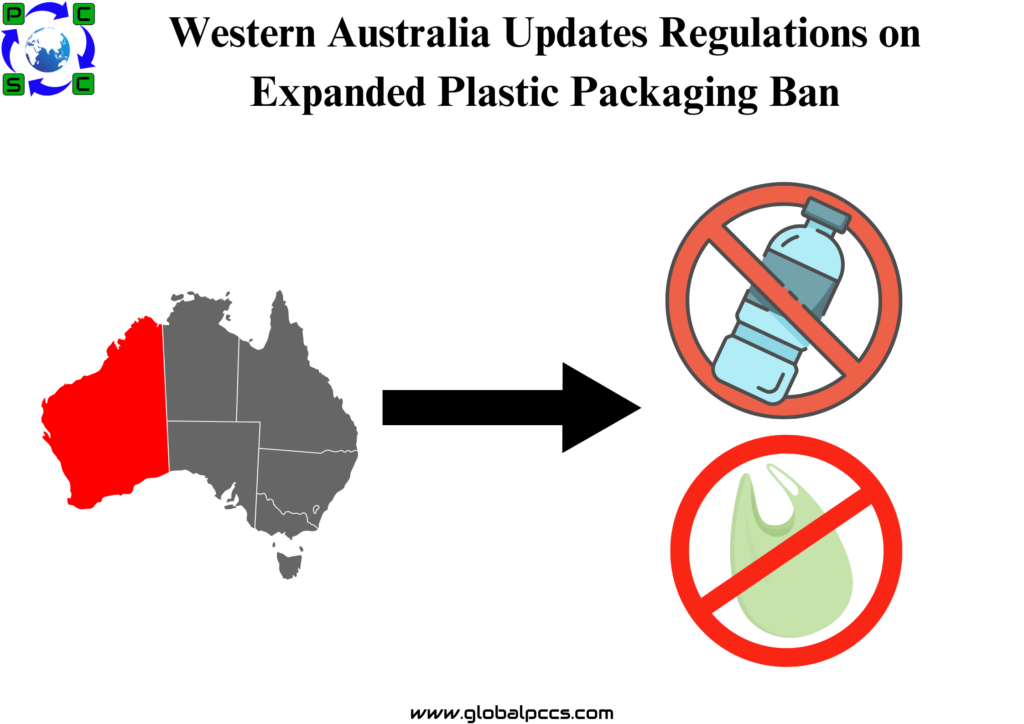 Adding electronics over 25 kg into exemption scope:
Adding electronics over 25 kg into exemption scope:
In May 2024, the Department of Water and Environmental Regulation (DWER) of Western Australia released the latest version of the “Guidance on the Expanded Plastic Packaging Ban.” This guidance explains the statutory interpretation and details of the exemptions for molded expanded plastic packaging, which will be banned from July 1st, 2025 under Article 17F of the “Environmental Protection (Prohibited Plastics and Balloons) Regulations 2018.” With this update of the guidance, electronic devices weighing over 25kg are now also eligible for exemption, thus the manufacturers/importers of such goods can use expanded plastic packaging materials.
Exemption Usage
The following uses are the exemptions, and the items in red are additions or revisions made in the latest guidance:
- Flexible foamed plastic wraps and sleeves
- packaging for fragile and precision products
- Packaging for products weighing more than 45 kg (excluding the packaging weight)*
- Packaging for products where the packaging is a permanent part of the product’s carry case or kit
- Packaging for a previously purchased product in transit for repair
- ‘Foam boxes’ for fresh produce and bulk cold home or from store-delivered meal services where there is an opportunity for retailer collection and reuse
- Packaging retained by a business after the installation of consumer goods by a professional installer
- Specialist packaging for medical applications (e.g. organ transport or pharmaceuticals)
- Moulded expanded plastic packaging used to repackage repaired goods supplied before the enforcement date
- Packaging for the building and construction industry
- Packaged products manufactured before 1 March 2025
- Packaging sent between businesses
Business-to-business (B2B) exclusion
The ban on molded expanded plastic packaging under the “Environmental Protection (Plastic and Balloon Ban) Regulations 2018” only applies to business-to-consumer (B2C) packaging, and not to business-to-business (B2B) packaging. Here, B2B packaging is defined as follows:
Packaging used for the containment, protection, or handling of a product where the end customer, prior to the packaging reaching end-of-life, is a business or institution.
While some companies may sell the same prepackaged products to consumers or supply them for use in the workplace, this guidance stipulates that they are considered B2C products in such cases.
In addition, if the product is installed by a professional installer and the molded expanded plastic packaging is retained by this installer, or if such packaging is retained and disposed of as part of the assembly or installation work, it is exempted. In such cases, it is recommended that businesses indicate to installers or product users how to properly handle and dispose of product packaging, and instruct installers or businesses as to whether or not they should be retained.
Exemption for fragile products
In the previous guidance, a specific list of “fragile products” that are exempted from the application was not included, but in the latest guidance, Appendix I was newly added, and the following products were specified as products that allow the use of expanded plastic packaging materials as fragile products:
- Refrigeration equipment with pre-charged refrigerants
- Air-conditioners with pre-charged refrigerants
- Large mirrors and vases
- Bespoke or one-off sculptural glass and art applications
- Heavier weight electronic appliances as per the class exemption SUP0002/24/1
Exemption for electronic devices based on exemption notice SUP0002/24/1
The above “SUP0002/24/1” stipulates the conditions for electronic devices that are exempt from the ban (i.e. products that can use molded expanded plastic packaging materials). The “conditions” referred to here are electronic products with a net product weight of over 25 kg and under 45 kg that have supply chain issues.
The electronic devices listed in this notice are as follows, but are not limited to these:
- Televisions
- Dishwashers
- Rangehoods
- Washing machines
- Dryers
- Ovens
- Cooktops and hotplates
- Fridges and freezers
- Cooking appliances
If you wish to be exempted, you must submit an exemption evaluation report to the CEO of DWER, summarizing the following information, before April 30, 2026.
- Company name
- Which products their use of the exemption relates to
- Or within 30 days of adding a new product using this exemption.
In the event that it is discovered that the conditions for exemption from application stipulated in SUP0002/24/1 have not been complied with, the person subject to the exemption (exemption holder) must notify the CEO of DWER in writing of the following information within 14 working days.
- Which condition was not complied with
- The time and date when the non-compliance occurred
- The details and result of any investigation undertaken into the cause of the noncompliance
- What action has been taken and the date on which it was taken to prevent the noncompliance occurring again
- And what action will be taken and the date by which it will be taken to prevent the noncompliance occurring again.








 Authorised IMDS & CDX Training & Consulting partner for
Authorised IMDS & CDX Training & Consulting partner for






